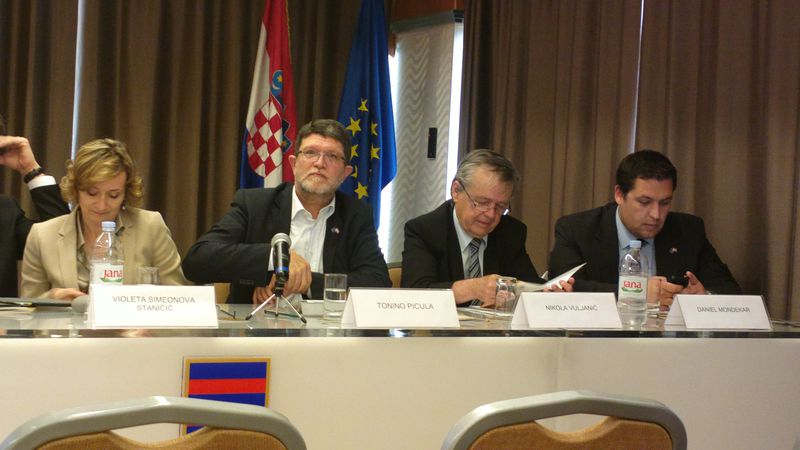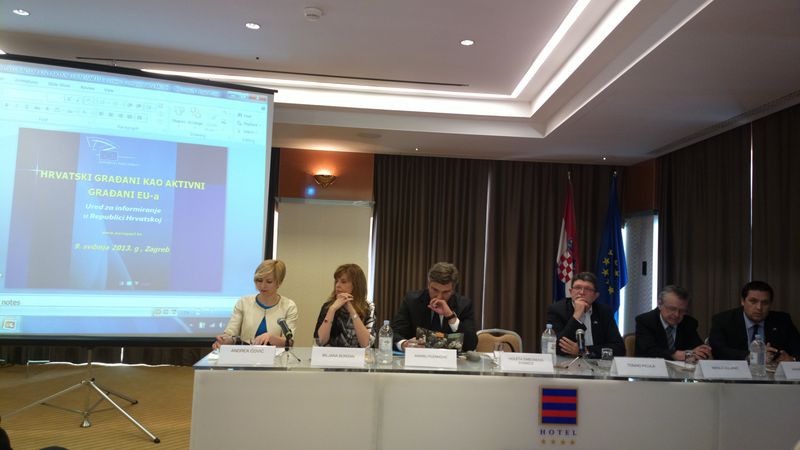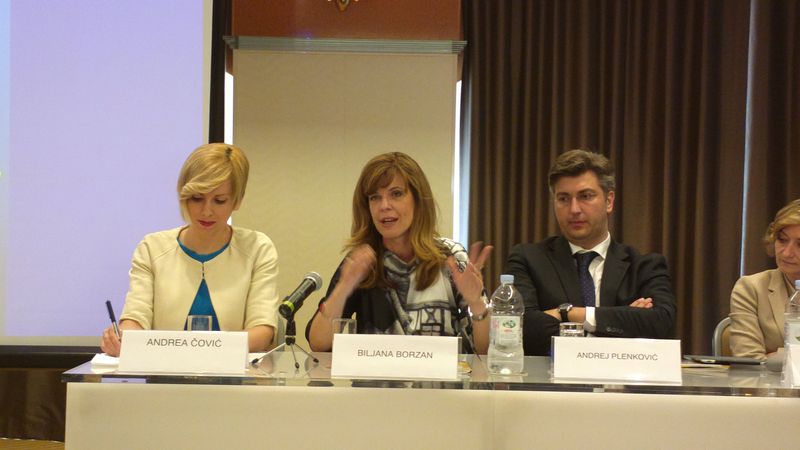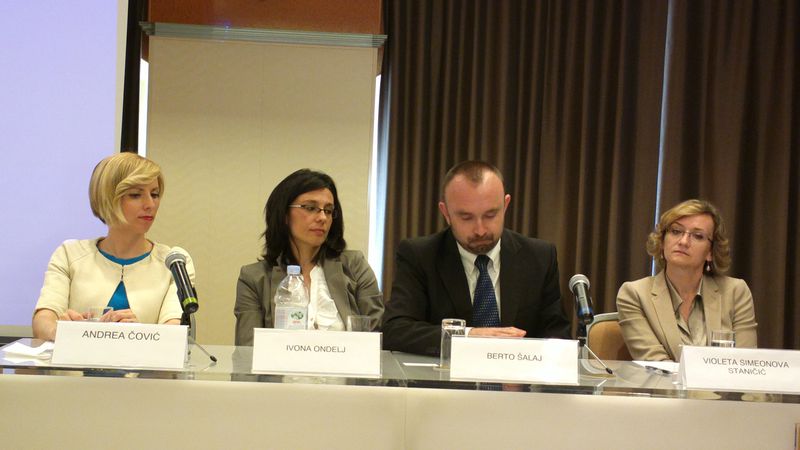Croatia Has Changed Mindset. Next Step Is Active Citizenship
Adelina Marini, May 10, 2013
Do you remember when the former tsar of the Bulgarians, Simeon Saxe-Coburg Gotta, called for a change of mindset? We laughed a lot back then. And it was even funnier when it became clear after his rule that he was hardly the person to talk about a mindset change. Nonetheless, against the backdrop of the election campaign in Bulgaria, but also the entire situation with the degradation of people, political class, state institutions and values in general, a change of mindset is still an open issue. I remembered about it while I listened for the first time after the debut elections for the European Parliament in Croatia to some of the newly elected MEPs. Of this reminded me Nikola Vuljanic. He is a member of the Croatian Labourists (a workers' party).

According to him, the accession process of Croatia (scheduled for July 1st) took 10 years because that much were needed for a mindset change. If we had changed our mindset earlier, we would have joined the EU earlier, Mr Vuljanic said. But what is a mindset change? I think, on this website on a number of occasions it was mentioned what data should a European mindset contain and that they are fairly broadly formulated, allowing for a pretty broad interpretation. And here, Mr Vuljanic again comes to help saying that the big benefit from EU membership is not the absorption of European funds which, just like in Bulgaria before accession, is the main focus of the conversation about membership here. The big benefit, the MEP believes, are the rules of the game.
And the rules of the game are painfully well known and are quite clichéd, while for Bulgaria in particular they are emptied of any content - those are rule of law, respect for human rights - that includes the right of a choice who should represent us in government without us being forced to sell our vote, the right of a religion or sexual orientation, of family and other values, in general the right to be the person you want to be. The rules also mean intolerance for corruption (both small and high level corruption). And here, the change of mindset seems most difficult because it requires from us to realise that if we give 20 levs (10 euros) to a traffic police officer to make him close his eyes for a minor violation, then we sort of easily accept our politicians to wrap up a pack or two of money from a public procurement to bring home.

The change of mindset requires from us to impose zero tolerance on any violation of rules. In Bulgaria specifically, we are amazingly tolerant to any seemingly minor violations - be it traffic rules violations or public order violations.
If we knew earlier how exactly to impose those rules, we would have been in Iceland's position, said Nikola Vuljanic. He did not say what exactly did he have in mind under "Iceland's position", but it is fairly clear. This is one of the most stable and developed democracies in the world, as it is very important not to mistake the level of democratic development with the economic crisis. A country which has succeeded in a very short time to exit the crisis and can even afford deciding whether to join the EU or to remain in a privileged partnership. It is not about the fact that some Croats also want to import the Icelandic model in Croatia (as there were such calls in Bulgaria). On the contrary. Nikola Vuljanic is another Croat who, without saying it directly, demonstrates a strong self confidence (not entirely without justification) of a man coming from a country that could handle things on its own, without external help, without the EU's whip.
Of that feeling reminded me Biljana Borzan, too, who was elected MEP from the list of the ruling Kukuriku coalition between Premier Milanovic's Social Democrats, Vesna Pusic's Liberals and one of the pensioners' parties. She believes that Europe today is divided into poor and rich or even into donors and net recipients. Given the average gross domestic product of Croatia, we will be in the group of the net recipients, she said, therefore there is a risk that we can feel less self confident. The fear of inferiority is not a rare phenomenon in Croatia, but not in the sense of the complex of the small country, rather in the sense of being incapable to manage on its own with your problems. It is not once that you can hear here Croats saying that they can well do without the EU, which was really well illustrated at the referendum in January last year, which hardly passed.

And if Vuljanic claims that the Croats have already changed their mindset, the next challenge for them is to turn into active citizens. The meeting with the Croatian MEPs took place on Europe Day, May 9th, and was organised by the Information Office of the European Parliament in Zagreb. Therefore, the topic of the round table was linked to the EU topic this year - European citizenship. While I was listening to the speakers, I was tormented by the question - what is active citizenship? What does it mean to be a citizen, first and second to be an active citizen? 2013 is pronounced the European year of citizenship, meaning to know our rights as EU citizens. This sounds a bit cynically against the backdrop of the closed Schengen borders for Bulgarians and Romanians and the increasingly falling barriers in many member states for workers and migrants in general from the new member states. Something which is about to happen to the Croats as well, for whom The Netherlands, for instance, is closing its labour market.
But beyond the conversation about how equal we are in EU and whether at all the Union is what it claims to be, we, in the young member states of the EU, need to answer the above questions. What does it mean to be citizens? In order to be citizens, first we have to stop being subjects and thereafter we will easily become European citizens, said Croatian political analyst Berto Salaj. But this still does not answer the question what does it mean to be an active citizen.

After 1989, we accepted that democracy and citizenship are reduced to only voting, which is already boring for us, weary and when too much of a choice appears we pull off because of the need to inform ourselves too much. As in Bulgaria so in Croatia you can often hear "whom should I vote for", "everyone are rascals", "I have no choice", "they are all the same", "nothing depends on my vote", etc. The Bulgarian blogger, the Nervous Shark, explains [in Bulgarian] very well what exactly does it mean to be an active citizen. According to her, one should participate in the party process no matter in what capacity - be it as a member, a sympathiser or simply an interested person. Being a member of a political party means you can influence the choice of candidates, the programme and the coalition policies.
But if you think this is too much of a commitment that will eat too much of your time, then you can choose a little more distanced position - to be active by informing yourselves better and not only from the mainstream channels that have hopelessly failed in Bulgaria. Or to put it simply, to be active means to seek and not to wait being offered. Protests, petitions, the EU citizens initiative, blogs if you like, are all things through which you can be an active citizen. After all, our choice has consequences that can seem to you really small - four years - but think what do four years mean in your life. Or many times by four years when you had expectations, hopes, aspirations, but in fact you waited someone else to deliver those expectations and hopes to you.
It is hard to become a citizen in one night. Obviously in Bulgaria, it is hard even in 23 years. That is why Berto Salaj, the Croatian political scientist from the University of Zagreb, said that the way a society of active citizens can be built is through the introduction of civil education in schools. Croatia, in his words, is one of the very few European countries where there is no such subject in schools. In Bulgaria, there is no such subject, too. It is time that we demand it. For the sake of citizenship - national and European.
 Kolinda Grabar-Kitarovic | © KGK
Kolinda Grabar-Kitarovic | © KGK Jozo Rados | © European Parliament
Jozo Rados | © European Parliament Aleksandar Vucic, Andrej Plenkovic | © Vlada RH
Aleksandar Vucic, Andrej Plenkovic | © Vlada RH